- Home
- The Spring Garden
- Rhododendrons and Azaleas
Rhododendrons and Azaleas
Rhododendrons and azaleas are gorgeous assets to the spring garden with multiple uses. All azaleas are rhododendrons, but not all rhododendrons are azaleas. All of them are included under the genus, Rhododendron, but what is the difference? Those known as rhododendrons are evergreen (with a few exceptions) and are generally larger and have larger leaves and flower trusses than azaleas. And, among azaleas there are evergreen and deciduous types. Confused? Some of the technical differences include the number of stamens and the construction of the underside of the leaves. But, we don’t need to know those details, we just want to choose the prettiest ones best suited for our gardens! Rhododendrons benefit from light shade (especially where summers are hot), organically rich acidic soil, even moisture, and excellent drainage. Planting too deep is often a cause of failure, as they are shallow-rooted. They should be planted an inch or so higher than they grew in the nursery or container, and mulched with wood chips or oak leaves.
Note: All parts of this plant are poisonous if eaten, including honey made from rhododendron nectar.
Deciduous Rhododendrons and Azaleas
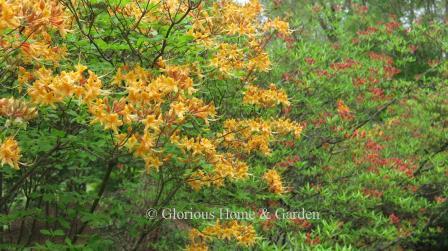
“I have spoken to plants myself, and if pressed for conclusions would have to say that those I threatened did better than those I - well, I wouldn't say prayed over, but pleaded with, cajoled. A rhododendron that hadn't bloomed for six years was flatly told it would be removed the following year if there were no flowers. Need I say that it has bloomed profusely ever since?” — Eleanor Perenyi
Deciduous azaleas are some of the most beautiful flowering shrubs for the garden. Not only do they possess beautiful flower forms and eye-catching colors, but most are delightfully fragrant and attract butterflies and hummingbirds to the garden. They are excellent additions to the shrub border, woodland garden, or as an accent plant. They all prefer rich, humusy, acidic soil, and excellent drainage (so beware of planting too deeply). They like morning sun and some protection from direct, strong afternoon sun. A beautiful addition to any garden. A warning though, deer love them! I took a picture of the ‘Spring Sensation’ Aromi hybrid below while it was still in the pot, then planted it, and the next day found that all the buds had been nibbled off overnight
Rhododendron arborescens, sweet, or smooth azalea, Zones 4-7. Of all the eastern native North American azaleas, this species is said to be the most fragrant. The white flowers have pink to reddish stamens and bloom in late spring or early summer after the leaves have emerged.
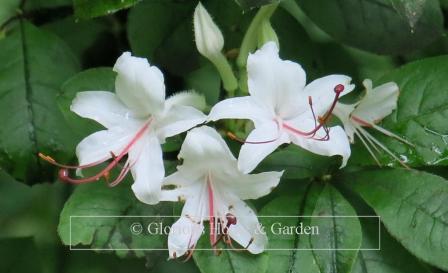 Rhododendron arborescens
Rhododendron arborescensAromi hybrid azaleas, Zones 5-9. This is a group of deciduous hybrid azaleas bred by Dr. Gene Aromi of Mobile, Alabama, in order to develop azaleas similar to the English Exbury hybrid azaleas, that could withstand southern heat and humidity. By crossing Exbury hybrids with some of our native species he succeeded in producing hybrids with the best of both—large flower trusses from the Exburys, and heat tolerance, disease resistance, and great fragrance from the natives. A few cultivars include 'Amelia Rose,' deep pink; ‘Clear Creek,’ soft yellow with white at the base and pink stamens; ‘Country Cousin,’ pink with orange blotch; ‘Dancing Rabbit,’ bright yellow; ‘Queen’s Lace,’ cream w/darker yellow blotch; ‘Red Pepper,’ red-orange; ‘Spring Sensation,’ pink buds open white w/pink streak on each petal and pink stamens; ‘Tipsy Tangerine,’ orange; ‘White Star,’ white w/yellow blotch.
The Mobile Botanical Gardens has a great collection.
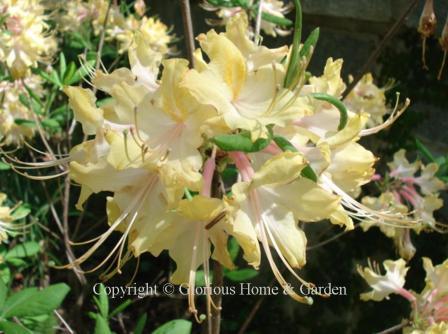 Aromi hybrid azalea 'Clear Creek'
Aromi hybrid azalea 'Clear Creek'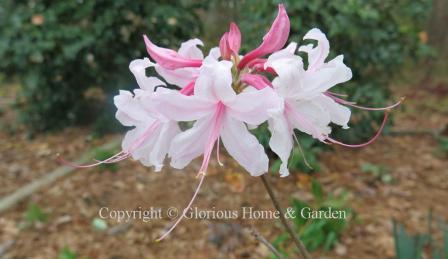 Aromi hybrid azalea 'Spring Sensation'
Aromi hybrid azalea 'Spring Sensation'Rhododendron austrinum, Florida azalea, Zones 7-9. This native azalea can light up a shrub border with its eye-catching fragrant flowers in shades of creamy white to nearly red. Like most true azaleas, this one is deciduous. Some selected cultivars include 'Admiral Semmes,' golden-yellow; ‘Apricot,’ apricot; ‘Don’s Variegated,’ orange w/variegated foliage; ‘Escatawpa,’ yellow-orange; ‘My Mary,’ yellow; and ‘Reagan,’ reddish-orange.
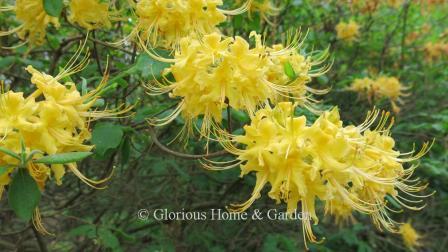 Rhododendron austrinum
Rhododendron austrinum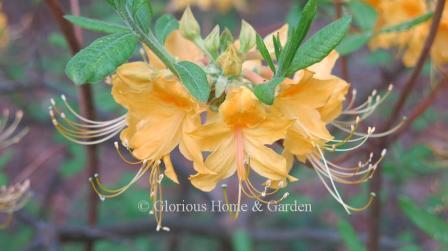 Rhododendron x 'Admiral Semmes'
Rhododendron x 'Admiral Semmes'Rhododendron calendulaceum, flame azalea, Zones 5-7. Flame azalea is a native to much of the Appalachian chain from New York to Georgia. The flowers can be quite variable in color ranging from yellow to yellow-orange to orange-red to red, and are not fragrant, but are very showy. They bloom in late spring or early summer, and prefer light shade and even moisture.
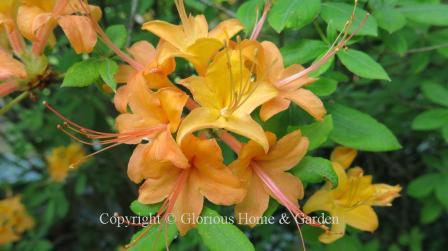 Rhododendron calendulaceum
Rhododendron calendulaceum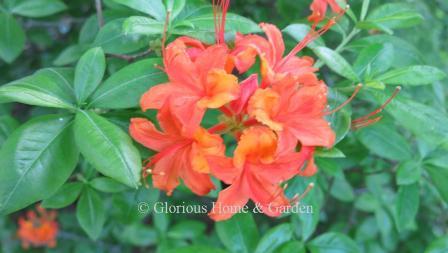 Rhododendron calendulaceum 'Smokey Mountaineer'
Rhododendron calendulaceum 'Smokey Mountaineer'Rhododendron canescens, Piedmont azalea, Zones 5-9. This deciduous azalea, native to the southeastern U.S., is a beauty and one of my favorites. I'm a sucker for pink! Beautiful pink tubular flowers with long pink whiskery stamens form in clusters and are delightfully fragrant.
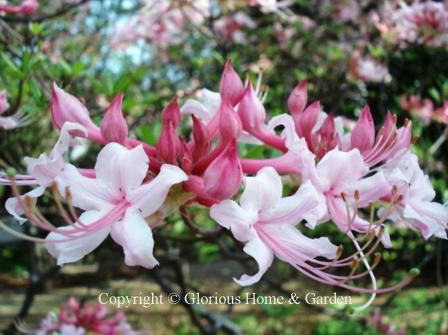 Rhododendron canescens
Rhododendron canescensRhododendron luteum, Pontic azalea, Zones 5-6. This is a deciduous azalea native to Asia Minor and eastern Europe with memorable bright yellow fragrant blooms in late April to May. This one caught my eye in the gardens at Winterthur.
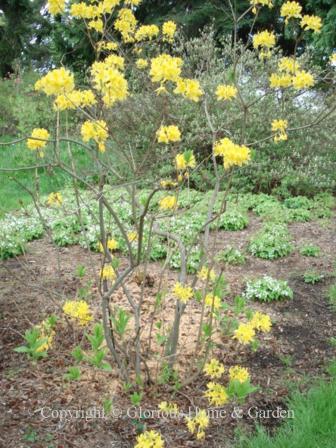 Rhododendron luteum
Rhododendron luteumNorthern Lights series hybrid azaleas, Zones 3-7. Deciduous azaleas for northern zones? Absolutely! Northern Lights is a special series bred for bud hardiness and ability to withstand cold temperatures. They require full sun, acidic soil, and good drainage. The series includes ‘Candy Lights,’ lavender ; ‘Golden Lights,’ yellow ; ‘Mandarin Lights,’ red-orange ; ‘Pink Lights,’ pink ; and ‘White Lights,’ white.
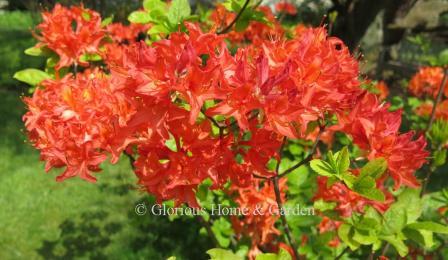 Rhododendron 'Mandarin Lights'
Rhododendron 'Mandarin Lights'Rhododendron prunifolium, plumleaf azalea, Zones 5-8. This deciduous azalea is native to southwestern Georgia and southeastern Alabama is valuable for extending the azaleas season as it blooms in July. The red-orange flowers are striking, but not fragrant.
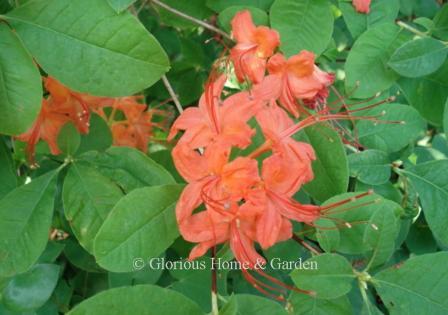 Rhododendron prunifolium
Rhododendron prunifoliumRhododendron schlippenbachii, royal azalea, Zones 4-6. I would love to have this azalea species in my garden with its lovely pale pink fragrant flowers that smother it in May, but it does not like the heat and humidity of the South. For those who live in the Northeast, however, this is one to consider. Royal azalea grows in an upright vase shape to about 6’ or so, and in the fall the leaves turn glorious colors of yellow, orange, rose, and red. This one was at Winterthur in Delaware.
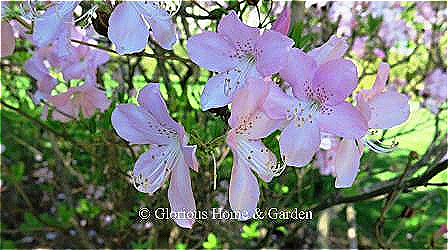 Rhododendron schlippenbachii
Rhododendron schlippenbachiiRhododendron vaseyi, pinkshell azalea, Zones 4-7. This is a lovely native azalea of the eastern Blue Ridge Mountains with downward-facing blooms of rosy pink, and good fall color. Best in northern zones with cooler temperatures, or higher elevations such as the Highlands, N.C. area.
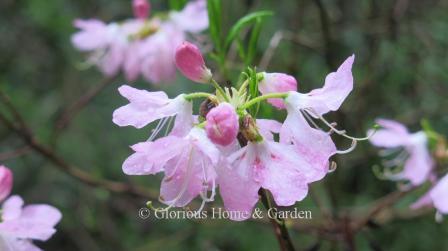 Rhododendron vaseyi
Rhododendron vaseyiRhododendron viscosum, swamp azalea, Zones 3-9. Swamp azalea, as the common name implies prefers moist areas near swamps and the edges of ponds. The species has white flowers that are richly fragrant and bloom in May. Cultivars have been selected such as the pink ‘Soir de Paris’ below.
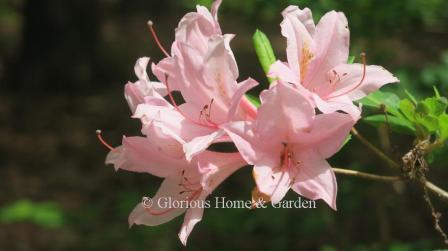 Rhododendron viscosum 'Soir de Paris'
Rhododendron viscosum 'Soir de Paris'Evergreen Rhododendrons and Azaleas
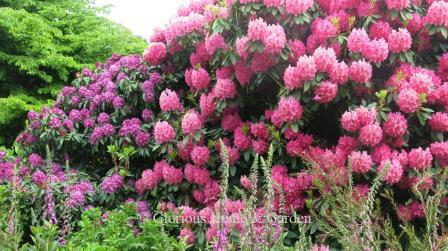
Evergreen rhododendrons and azaleas are the most magnificent flowering shrubs for the eastern part of the United States, and the Pacific coast. The bloom period is relatively short, but what a spectacle it is in the spring garden. Even out of bloom, rhododendrons and evergreen azaleas make an attractive, dark green backdrop, as other plants take center stage. They have multiple uses, too, as backgrounds as mentioned, as specimens, as hedges, or as privacy screens.
Many groups of hybrids have been developed by crossing species for traits such as cold hardiness, heat and humidity tolerance, large blooms and repeat flowering. Genetic mutations also occur among native populations, and varieties are selected and named for their marked differences from the species. There are so many cultivars that it is best to purchase from a local nursery that stocks varieties that were developed for your area. Here are a few of the species and hybrid groups available.
Rhododendron carolinianum, Carolina rhododendron, Zones 5-8. Native to the mountains of the Southeastern U.S. This is a smaller shrub than Catawba below, and like all rhododendrons prefers rich soil, adequate moisture with good drainage, partial shade and cool temperatures.
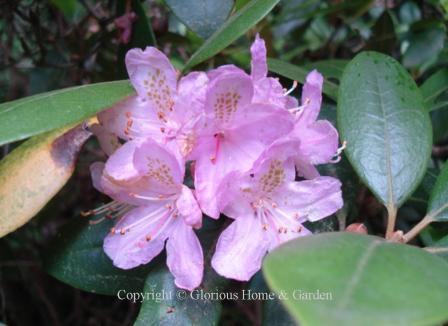 Rhododendron carolinianum
Rhododendron carolinianumRhododendron catawbiense, Catawba rhododendron and hybrids, Zones 4-8. Another native species, this shrub is larger is all aspects that Carolina rhododendron, leaves, flower trusses and overall size are larger and more impressive. This species is also more cold hardy. Many beautiful cultivars have been developed from the species with colors ranging from white to pink, lilac, purple, and red—even yellow. Some of them include ‘Boule de Neige,’ white w/green speckles; ‘Cynthia,’ rose; ‘English Roseum,’ lilac-rose; 'Gomer Waterer,; white; ‘Horizon Monarch,’ yellow; ‘Jean-Marie de Montague,’ light red; ‘Nova Zembla,’ red’ ‘Peter Alan,’ purple w/dark splotch; ‘Purpureum Grandiflorum,’ purple; and 'Sappho,' white w/dark purple splotch.
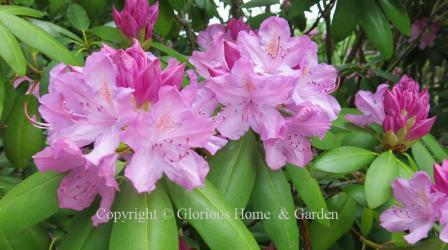 Rhododendron catawbiense
Rhododendron catawbiense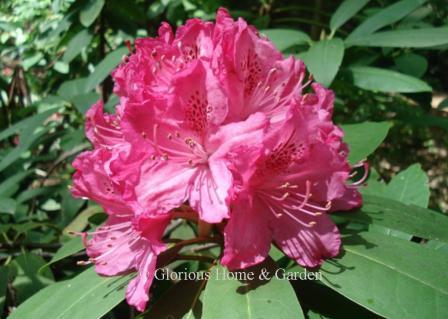 Rhododendron x 'Cynthia'
Rhododendron x 'Cynthia'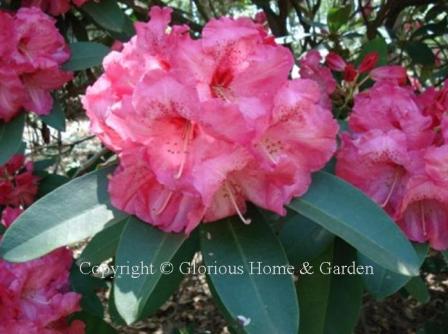 Rhododendron 'Jean Marie de Montague'
Rhododendron 'Jean Marie de Montague'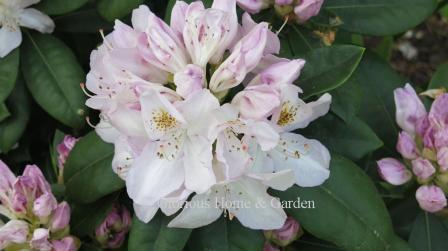 Rhododendron 'Gomer Waterer'
Rhododendron 'Gomer Waterer'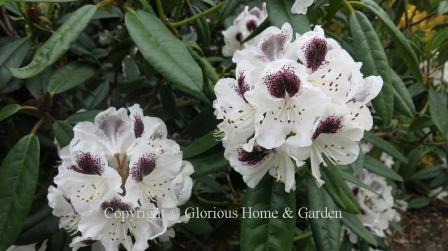 Rhododendron 'Sappho'
Rhododendron 'Sappho'Rhododendron degronianum ssp. yakushimanum, “Yak” hybrids, Zones 5-7. The species, from Yakushima Island, Japan, is a particularly lovely one, and has been the contributing parent to many beautiful hybrids, such as ‘Fantastica’ below. The species is smaller than many rhododendrons, growing to about a dense 3’ x 4’ mound with narrow, under-curved leaves. The bell-shaped flowers are rose-colored in bud opening to pink. Their compactness and soft colors make them excellent garden choices. Some hybrid choices include ‘Dreamland,’ pink to white; ‘Fantastica,’ red buds open to pink blooms; ‘Percy Wiseman,’ unusual peachy-pink and cream; 'Schneekrone' (Snow Crown), white; and 'Solidarity,' pink fading to white retaining pink on the edges.
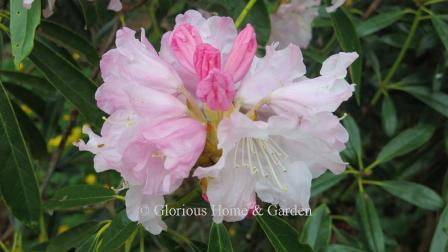 Rhododendron degronianum
Rhododendron degronianum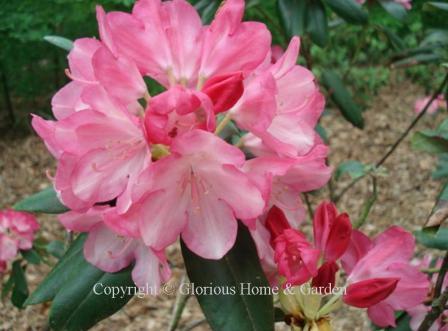 Rhododendron x 'Fantastica'
Rhododendron x 'Fantastica'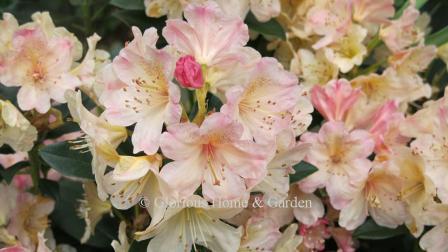 Rhododendron x 'Percy Wiseman'
Rhododendron x 'Percy Wiseman'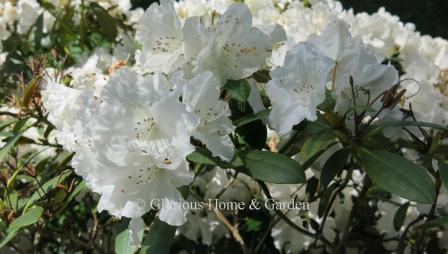 Rhododendron x 'Schneekrone'
Rhododendron x 'Schneekrone'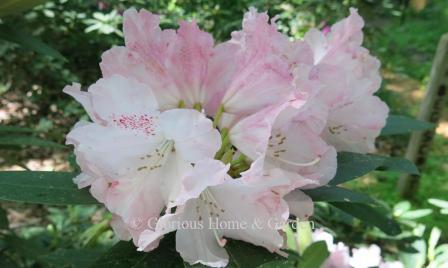 Rhododendron 'Solidarity'
Rhododendron 'Solidarity'Encore hybrid azaleas, Zones 7-10. Everyone is familiar with this series of evergreen azaleas that were bred to re-bloom in the fall. Available in a wide range of colors from white to pink, rose, salmon, coral, red-orange, red, lavender, purple, and bi-colors.
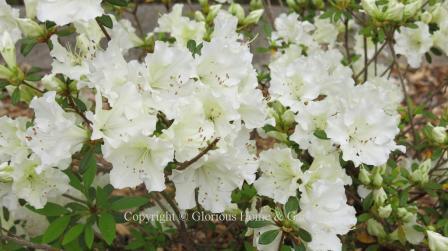 Encore azalea 'Autumn Starlite'
Encore azalea 'Autumn Starlite'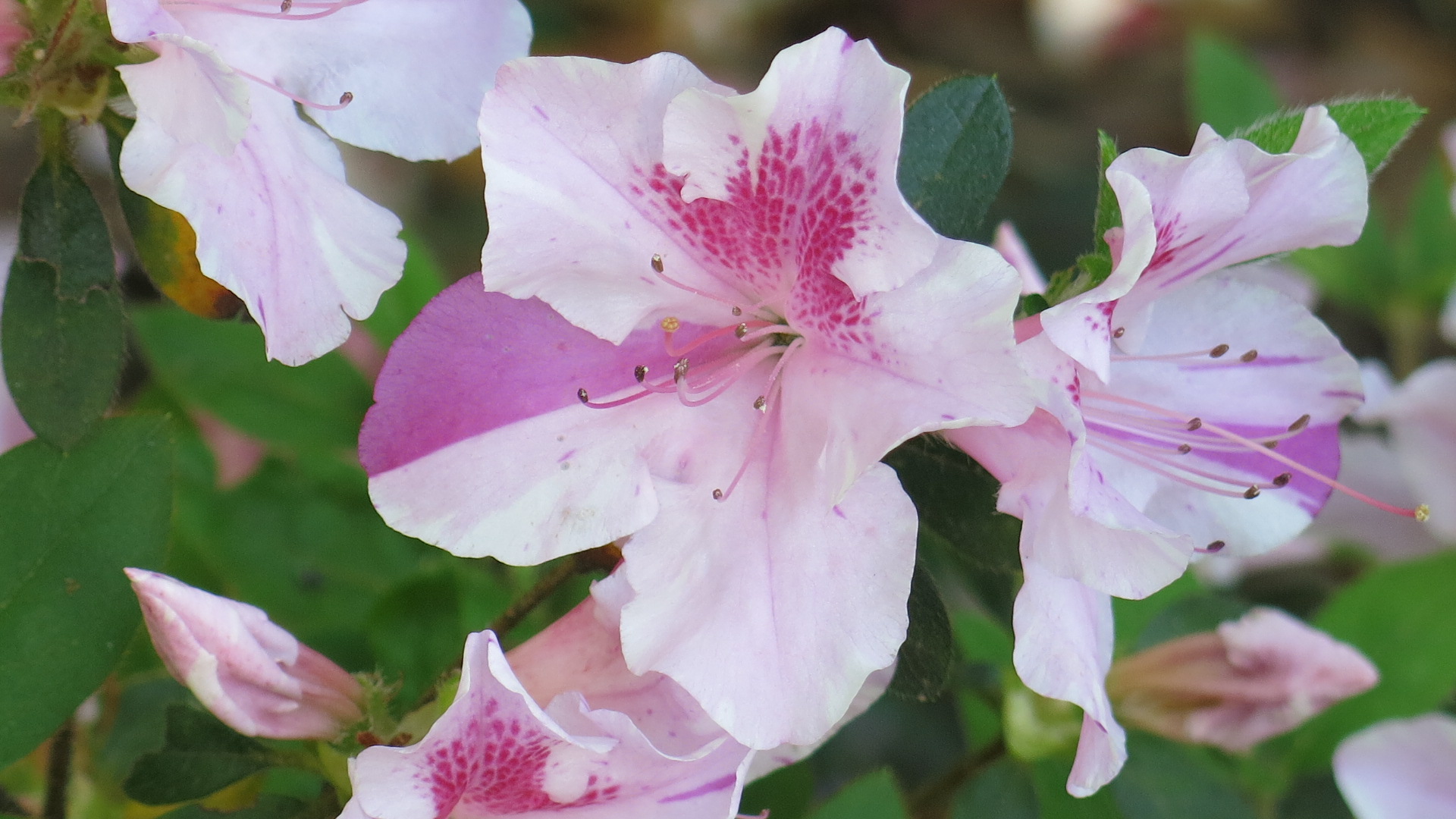 Rhododendron x 'Autumn Twist'
Rhododendron x 'Autumn Twist'Glenn Dale hybrid azaleas, Zones 6-9. The Glenn Dale hybrids were developed for cold hardiness, a wide range of color, larger blooms, and long flowering period. Hundreds were developed, but some of the best known are ‘Aphrodite,’ rose pink; ‘Fashion,’ salmon-pink; ‘Glacier,’white with green throat; ‘Pink Ice,’ pale pink; ‘Treasure,’ white w/pink. The Annmarie Sculpture Garden and Arts Center in Dowell, Maryland has a nice collection.
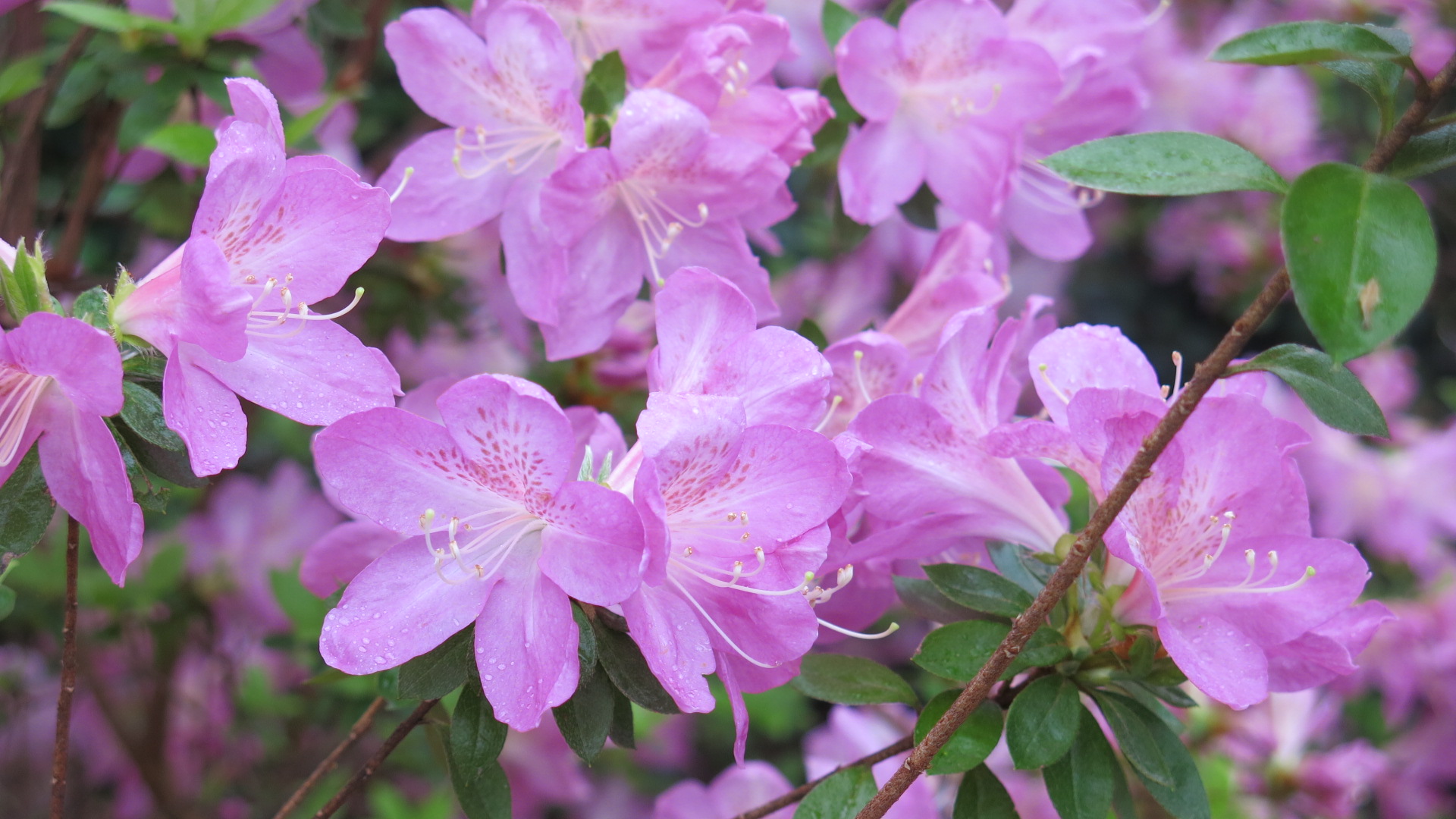 Rhododendron x 'Dayspring'
Rhododendron x 'Dayspring'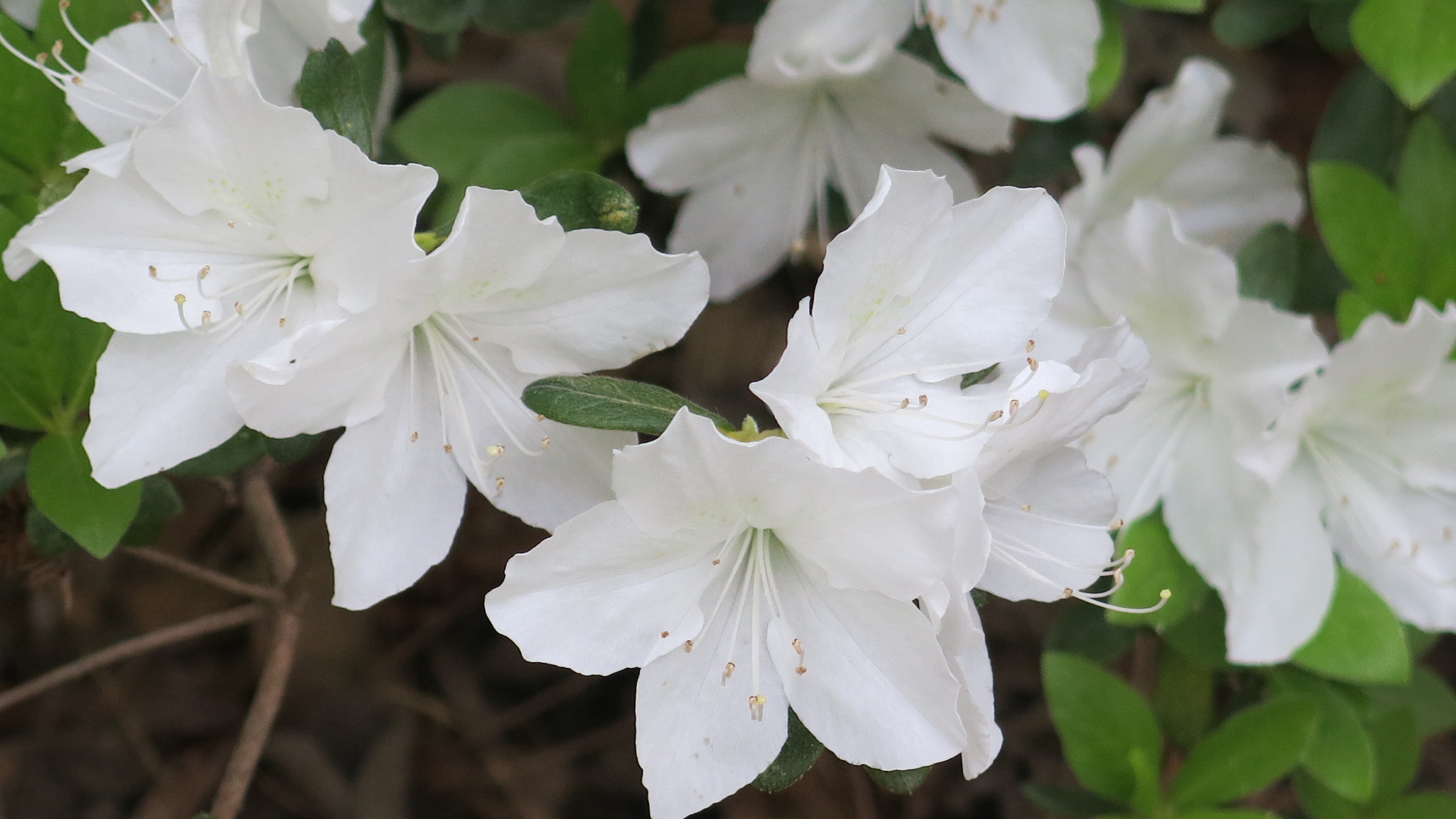 Rhododendron x 'Delaware Valley White'
Rhododendron x 'Delaware Valley White'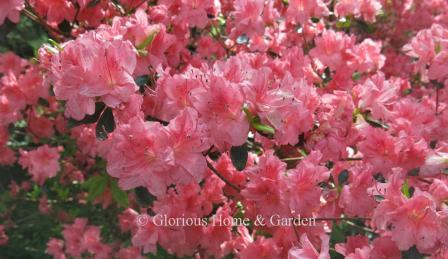 Rhododendron x 'Lullaby'
Rhododendron x 'Lullaby'Kurume hybrid azaleas, Zones 6-9. The Kurume group originated in Japan, and is well-known for its smaller flowers, many of the hose-in-hose type, wide range of colors and floriferous nature. These are some of the ones that I remember seeing at all the garden centers, especially before the advent of Encore and other series, but they don’t seem to be as common now. Familiar ones include ‘Coral Bells,’ coral-pink; ‘Hershey’s Red,' red; 'Hino-Crimson,' crimson-red; ‘Hinodegiri,’ red; ‘Pink Pearl,’ pink; ‘Sherwood Red,’ orange-red; ‘Snow,’ white’ and Tradition,’ pink.
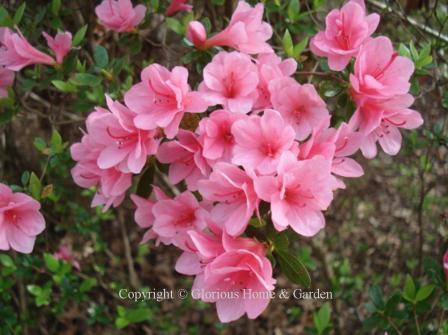 Kurume hybrid azalea 'Coral Bells'
Kurume hybrid azalea 'Coral Bells'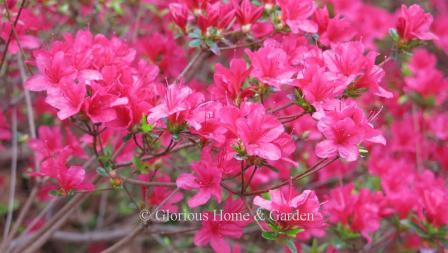 Rhododendron x 'Hino-Crimson'
Rhododendron x 'Hino-Crimson'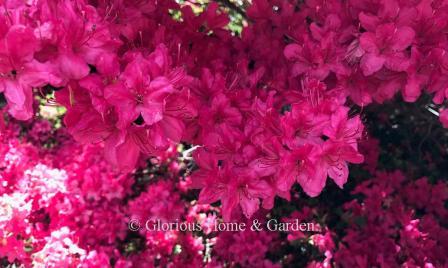 Rhododendron x 'Hinodegiri'
Rhododendron x 'Hinodegiri'Rhododendron macrosepalum,
large-sepaled azalea, Zones 6-8. Narrow,
spidery petals distinguish this evergreen azalea. ‘Koromo shikibu,’ below, is a hybrid of
unknown origin, though it is believed that R.
macrosepalum is one parent. It has lavender flowers with a sweet scent,
blooms mid-season, and can reach 8’ x 8’ in size. 'Linearifolium' has even narrower petals and leaves.
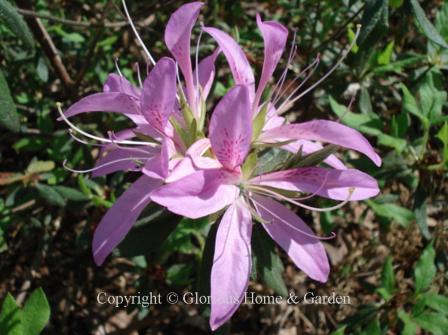 Rhododendron macrosepalum 'Koromo shikibu'
Rhododendron macrosepalum 'Koromo shikibu'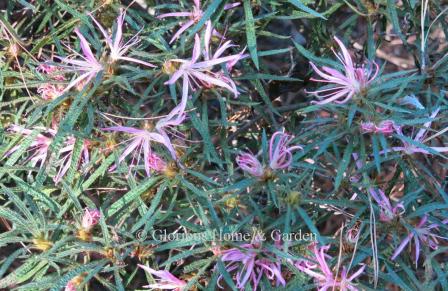 Rhododendron macrosephalum 'Linearifolium'
Rhododendron macrosephalum 'Linearifolium'Rhododendron maximum, rosebay rhododendron, Zones 3-7. Another Eastern North American native, rosebay rhododendron is quite common in shaded mountainous woodlands on slopes and along streams, and has not yet reached the popularity for home gardens that Catawba rhododendron cultivars have achieved in spite of its beauty due to specific cultural requirements. Flowers are usually white with green splotches, but can suffused with rosy-pink to purplish-pink. Fine for a home landscape as long as the requirements for moisture, excellent drainage and shade can be met.
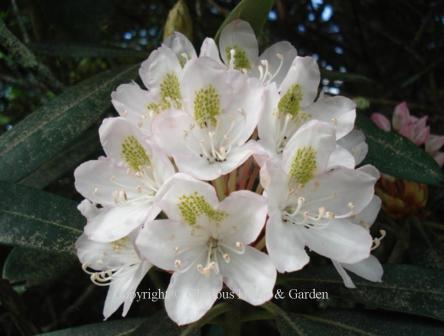 Rhododendron maximum
Rhododendron maximumRobin Hill hybrid azaleas, Zones 6-8. The Robin Hill hybrid azaleas are known for a long bloom period, often repeating in the fall, large blooms, and good cold tolerance. They are in the intermediate range growing about 2-4’ h. x equal width. Varieties include ‘Congo,’ purple; ‘Conversation Piece,’ dark pink with both solid and variegated flowers on the same plant; ‘Glamora’ white; ‘Hilda Niblett,’ variegated pink and white; ‘Laura Morland,’ pink; 'Nancy of Robin Hill,' light pink double; and ‘Wachet,’ lavender-pink.
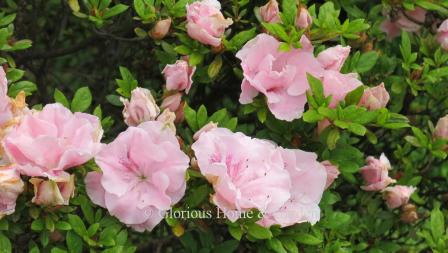 Robin Hill hybrid azalea 'Nancy of Robin Hill'
Robin Hill hybrid azalea 'Nancy of Robin Hill'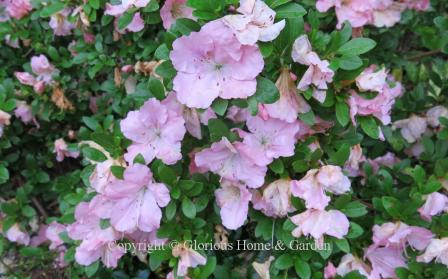 Robin Hill hybrid azalea 'Wachet'
Robin Hill hybrid azalea 'Wachet'Satsuki hybrid azaleas, Zones 7-9. Later blooming than other evergreen azaleas, the Satsuki hybrids have a spreading habit, are smaller growing and are often used for massing. Often called Gumpo azaleas due to the popularity of the “Gumpo” varieties in white, pink, rose and red.
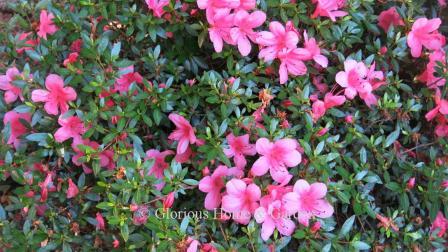 Rhododendron 'Chinsei'
Rhododendron 'Chinsei'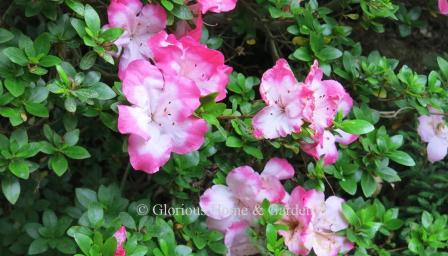 Rhododendron 'Kusadama'
Rhododendron 'Kusadama'Southern Indica hybrid azaleas, Zones 7-10. The Southern Indica (sometimes called Southern Indian) group of evergreen azaleas have been extremely popular due to their large blooms and heat and sun tolerance. These are large, vigorous shrubs that can reach 8-12’ in height with a 6-8’ spread, but can be kept in bounds with proper pruning. Pruning should be done immediately after bloom to avoid removing next year’s buds. Some of the best varieties include ‘Formosa,’ pink; ‘G. G. Gerbing,’ pure white; ‘George L. Tabor,’ pink with white variegation and darker pink blotch; ‘Judge Solomon,’ pinkish-purple.
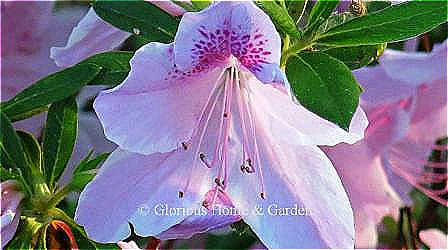 Rhododendron 'George L. Taber'
Rhododendron 'George L. Taber'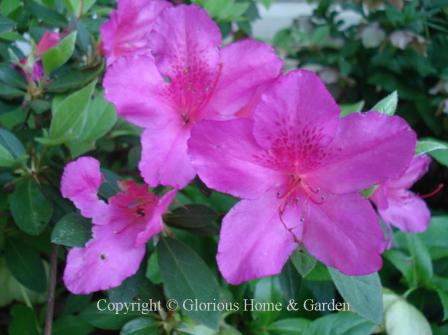 Rhododendron x 'Judge Solomon'
Rhododendron x 'Judge Solomon'Return to Spring Flowering Shrubs
Plant of the Month
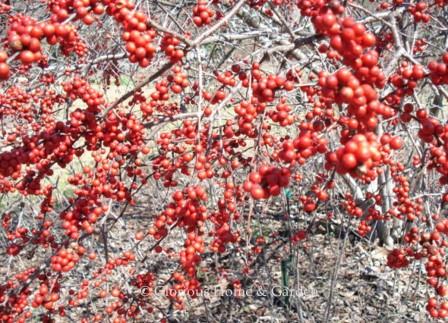
Ilex verticillata
Winterberry holly
Updated new USDA Plant Hardiness Zone Map 2023.